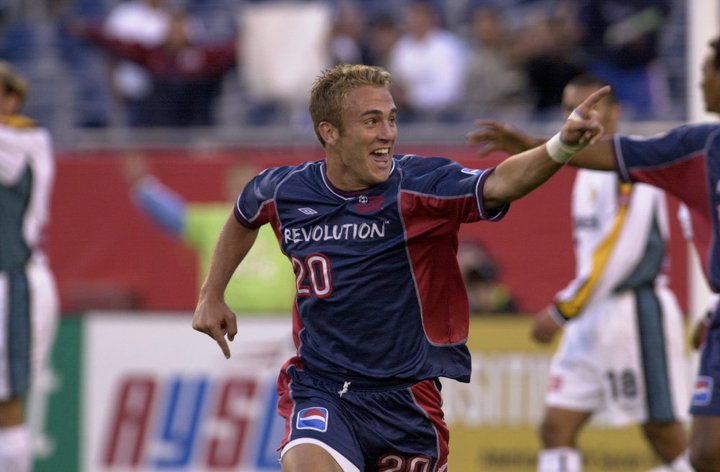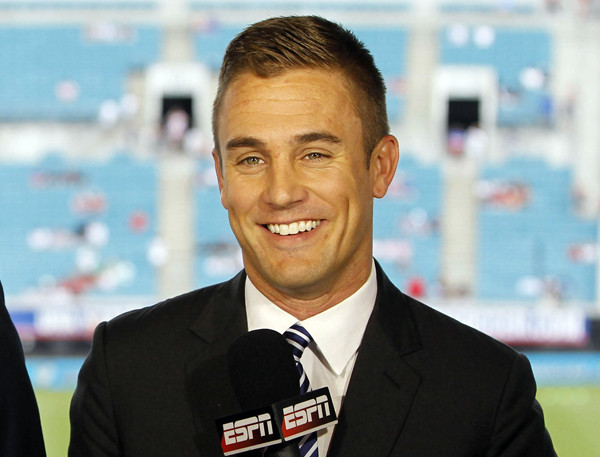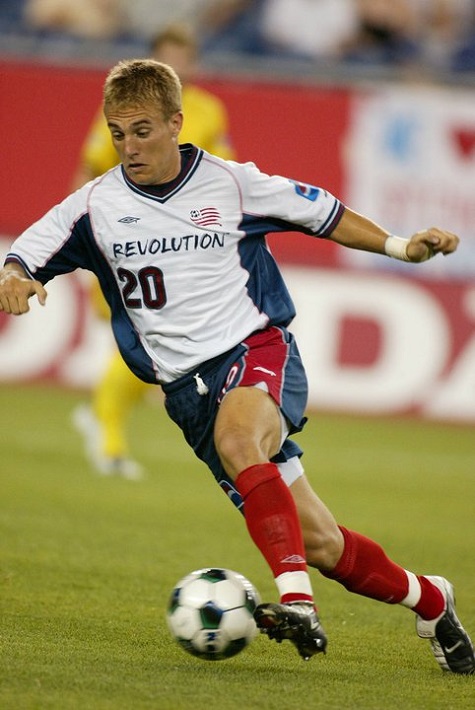Taylor Twellman On High School Soccer, Frustrations with College Soccer & Being Smart on Head Injuries
Former MLS Star Taylor Twellman, now a television analyst for ESPN, on why playing for your high school is valuable and on the fact that you only have one brain, so you better take care of it.
Soccer News: Taylor Twellman was a professional soccer player in the MLS, who played striker for the New England Revolution between 2002 – 2010. During that time, he broke the record to become the youngest and fastest player to score 100 goals in the league.
Twellman is widely regarded as one of the best ever “predators” when in the opposition 18-yard box. He is currently ranked fifth in all-time career goals (101) and ranked fourth in career game-winning goals (28).
Twellman’s playing career was cut short due to a series of concussions he suffered during that time, with the final concussion coming on August 30, 2008, after scoring against LA Galaxy. Since then, Twellman has created an organization, ThinkTaylor, in order to raise awareness of brain injuries & create social change.

SoccerToday’s Interview with Taylor Twellman
Read: Taylor Twellman- Career Cut Short By Concussions
Diane Scavuzzo: Welcome – Thanks for joining us at SoccerToday. So do tell me, what are you doing with Allstate and the All American high school program?
Taylor Twellman: I’m really pumped about this just because I feel like it’s an avenue to recognize and motivate young soccer players.
We’re launching the first-ever Allstate Cup – All American Program. We’re recognizing the best high school soccer players in the country, who many of us believe — now that the sport’s grown so rapidly — are the future game changers of the sport.
The first 150 high school junior soccer players — 75 boys and 75 girls have been announced. We’ll do a remaining group of 100 players in the Spring and a total of 80 of those players will be selected to go to the Allstate All American Cup during MLS All-Star week this upcoming Summer in Orlando.
I’ll be one of the coaches and it’s honestly … knowing myself, how I went through high school and the dedication and passion, I think this is a pretty cool program because it’s only going to motivate kids.
Diane Scavuzzo: On the topic of playing high school soccer, which is quite controversial, what are your thoughts?
Taylor Twellman: Diane, as you said, it’s a hot topic discussion.
I don’t think there is a black and white answer. And, I’ve said this all along: I think there’s real quality high school soccer still in our country.
I look at myself coming out of Saint Louis, Missouri … that high school soccer is much better than a lot of traveling programs or club programs in our country.
I think it depends on each locale, each individual, but I do think high school soccer helps kids learn to deal with a little adversity. You’ve got to be able to go to class — the following day after you lose a game or you miss a chance —when students are looking at you and your friends are asking you questions.
There’s value to growing up playing high school soccer in front of your peers.

Diane Scavuzzo: So you think there’s a lot of value in high school?
Taylor Twellman: Yes, I do. I still do. There’s value in playing for the pride of your school and playing for your student body and having your girlfriend or your boyfriend go to the games. There’s value to that.
Diane Scavuzzo: Turning back time, if you were to have your career all over again, and you were 16 years old, do you think that you would automatically play in the DA — or, would you seriously think about playing soccer for your high school?
Taylor Twellman: I wouldn’t have been automatically DA – just because I could have played professional baseball. I had an opportunity to sign a contract with the Kansas City Royals out of high school. I just chose not to.
It is a much more difficult conversation to answer your question now — than it was back then — because of the trajectory of these young American players in the Development Academies who are now being seen by eyeballs that we were never seen by when I was in high school …
but I think I would have ended up still playing high school soccer.
The value of the New York City FC or New York Red Bulls development academy programs are very high — but it’s still a gray area discussion.

Diane Scavuzzo: Do you think that the Allstate program, as well as other high school soccer programs, help kids develop a deeper passion for the game?
Taylor Twellman: Absolutely. Whose to say that one of these high school players is not going be in the 2026 World Cup when the United States hosts the World Cup?
Diane Scavuzzo: So when you coach these players, how are you going to coach players from all over the country who you have such a limited time with?
Taylor Twellman: I look forward to hanging out with all these kids because they’re the future of our sport. Honestly, that is the reason why I’m doing this and why I want to be a part of the program. It keeps me in touch with the younger athlete.
I think the biggest thing is bringing them together and having these players recognize the magnitude of what they’ve done.
Am I coaching them in the sense that we’re going to have a tactical game plan?
No, absolutely not.
I think that’s going to be more of my “coaching mentorship” than, “Hey, we’re going to play three in the back.”
Diane Scavuzzo: Just thinking about all you have accomplished in your career brings up the thought of concussions. Do you think enough is being done to protect today’s youth soccer players from concussions?
Taylor Twellman: I think these youth kids that I will be seeing in Orlando have more resources about head injuries than any of us did growing up.
Now in saying that, it’s one thing to have the resources and the tools — it’s what you do with those resources and tools. I still think we can get better.
Diane Scavuzzo: I would love to get your advice for a young player who is on the field and gets injured — who may or may not have sustained a concussion, but is feeling that incredible sense of “I don’t want to stop the game” or “I don’t want to look weak.”
What would you tell them? What would you want to whisper in their ear?
Taylor Twellman: You can’t have surgery on your brain. You can have surgery on any other part of your body but not your brain.
Real simple, you only have one brain and it needs to last a lifetime.
Step off the field, at least you know you are ok and protect yourself for the future.
Diane Scavuzzo: And what would you say to a coach who looks at a player whose stumbling after an impact?

Taylor Twellman: You don’t want to go to bed at night knowing that you’ve risked he or she’s life because you were trying to win that current game. And, if you have any doubt in your mind that traumatic brain injury had occurred, you are the responsible adult and you better get that said player off the field otherwise that’s on you if that player has a concussion and never recovers.
Diane Scavuzzo: And what would you say to the parent who is dealing with a teenage boy who is saying, “I’m fine. I don’t need a doctor. I’m just fine.”
Taylor Twellman: So for parents, it’s really simple.
If you are more educated — and more often than not, we’re more educated than our kids — you understand the ramifications and the dangers. There’s really no dilemma keeping your kid out until he or she is fully healthy.
Diane Scavuzzo: The American pathway to becoming a pro, how and what are your thoughts about the college scene?
Taylor Twellman: I struggle with college soccer.
NCAA has changed every single sport in order to benefit the student-athlete for the next level except soccer.
You play two and a half months … first off, it’s actually abusing the student-athlete — you’re putting an undue and needless amount of pressure on student-athletes if they get a concussion Wednesday, trying to play for the weekend game because you haven’t given them enough time to heal.
The reality is college soccer’s going to die.
There are too many other avenues to further your career while getting an education and, in my opinion, college soccer’s a perfect bottom level tier of developing pro players.
It’s ridiculous because there’s a lot of good college coaches developing players for the next level, but their hands are tied. Because for eight and a half months you can’t do anything and then the other three months you play. It’s pathetic.
Diane Scavuzzo: What advice do you have for young players who want to become pros?
Taylor Twellman: I think the one thing that got me to where I was is I played every game as if it was my last. Ironically, my career ended up that way — but you never know when your last game’s going to be and you never want to have regrets.
To be honest with you, I think if we treated life the same way, we would not have a lot of regrets. You’re going to go all in. Unfortunately, I had to find that out through my injury.





